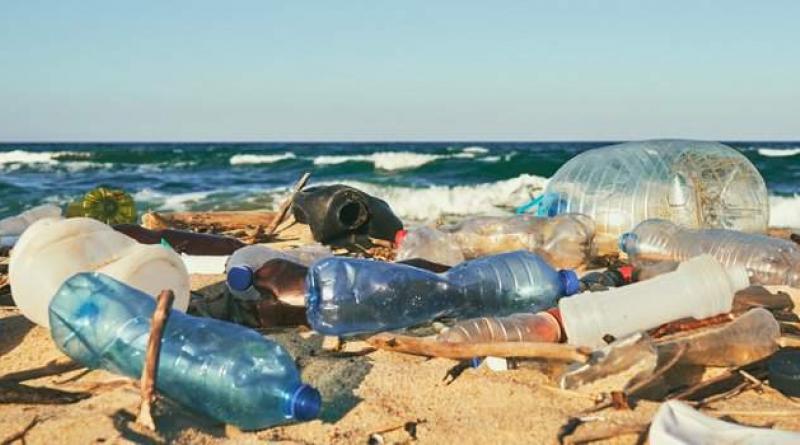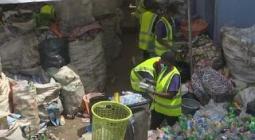From the scourge of plastic waste pollution in Africa to value addition and improved livelihoods.

The theme for World Environment Day celebrations in 2018 is “Beat Plastic Pollution.” There has been a big focus on the devastating impacts of plastic waste (particularly single-use plastics) on the marine environment, human health and regarding climate change. According to the World Bank Urban Development Series report Africa produces just about 70 million tons of waste which is expected to increase with population growth. Plastics waste poses a significant environmental challenge across the continent, but it also provides an opportunity for innovative and radical “outside the box” thinking, which can contribute towards helping Africa meet its Sustainable Development Goal targets and its Vision 2063 for the sustainable socio-economic transformation of Africa.
I believe that working together and collaboratively with all stakeholders (formal and informal), we can engender the behavioral changes required to beat plastic pollution in the medium to long term. This blog post highlights some of the progress being made in Africa at the governmental level to address the plastic pollution challenge, including examples of innovative solutions being developed towards recycling plastics. The article concludes with some thoughts for holistic approaches towards reducing plastic waste and beating plastic pollution on the continent.
Policy instruments and the role of Government
National Governments have a major role to play in beating plastic pollution and particularly addressing the current scourge of plastic waste on urban and rural landscapes across most African countries. Across Africa, several African countries(including Côte d’Ivoire, Cameroon, Mauritania, Tunisia, Kenya, Uganda Rwanda, Tanzania, Morocco, South Africa) have enacted laws related to the ban on the use, manufacture and importation of single-use plastic bags. In addition, some have also introduced the plastic bag levy, which is favoured in several countries across the globe, including the United Kingdomwith significant success in relation to behavioral change towards single use plastics. Outright bans on single-use plastics without viable and affordable alternatives (e.g. biodegradables or paper-based alternatives, which are often perceived as more expensive and “less durable”) could negatively affect some sections of society and small and medium-size enterprises (Côte d’Ivoire) or, as in the case of Rwanda, create a market for illegal trafficking. In some countries, such asSouth Africa, it has been reported that funds raised from the plastic bag levies are not entirely used in investing in recycling programs and programs that will bring about fundamental behavioral changes both at the individual or at the corporate level, towards beating plastic pollution for good. Countries such as Rwanda are overcoming these challenges by providing incentives such as tax breaks for companies to encourage recycling as well as to transform their production processestowards the production of biodegradable alternatives and also strictly enforcing legislation as part of a holistic programme for sustainably transforming their economy and banning all non-biodegradable plastics from the country.
The role of the private sector – Is there money in waste?
It has been reported that the waste and resource management sector in the UK, contributes about 41 billion pounds per annum to its economy. In the private (formal and informal) sectors across Africa, smart ecopreneurs and social impact investors have identified these opportunities and are turning them into viable value-added businesses and at the same time addressing one of the modern-day environmental challenges of our time. Examples of transformational activities related to plastic waste management in Africa include: innovative and cheaper pavement blocks for construction in Ghana and Cameroon; the production of plastic poles for construction, farming, road signage and beams for construction in Kenya and Tanzania; conversion of plastics waste into commercial synthetic fuels in Kenya; and the use of plastic waste to create school bags (fitted with a potable solar panel) to support access to education to disadvantaged children in South Africa. These types of activities create jobs (direct/indirect employment in manufacture, sourcing materials, etc.), sustain livelihoods for local communities and offer low-cost impactful climate change adaption solutions on the continent, but require coordinated approaches amongst all stakeholders. While the growth of innovative projects across Africa to tackle plastic pollution is laudable, one of the biggest challenges facing startups and most companies in this burgeoning sector remains access to finance which typically prevents scale up and affects viability and long-term sustainability of the businesses. There is evidence, however, that through concerted efforts, government regulations and incentives, along with heightened visibility of the positive impact across local communities, these types of projects will be sustainable in the short to medium term.
The way forward
Addressing the plastic waste pollution problem will require more holistic approaches, focused on upstream activities particular transitioning from a linear “use-throw” model to a manufacturing model focused on the circular economy, design for recycling aligned with radical behavioral changes as individuals and organizations. Big businesses must play their part is cutting out unnecessary packaging from their products and supply chains. Extended producer responsibility should encompass the full range of product lifecycle costs, including their end of life. Organizations should use their sustainable procurement strategies to encourage the minimization of unnecessary single use plastics along their supply chain.
Now is the time for big action at a global and local scale. Together, we can do it…. if we all put our minds to it. What do you think are the actionable solutions to beat plastic pollution?
-----------------------------------
Osric Tening Forton is an environmental risk and compliance management expert with public- and private-sector experience across Africa, Europe, the Middle East, India and Russia. Within the African Development Bank, he has developed the Bank’s Corporate Environmental Management System to ISO 14001:2015 standards and ESG reporting tools for enhancing the Bank’s environmental, social and governance (ESG) ratings linked to the attractiveness of the Bank’s green/social bonds. He holds a PhD in sustainable waste management from the University of Brighton, UK.




